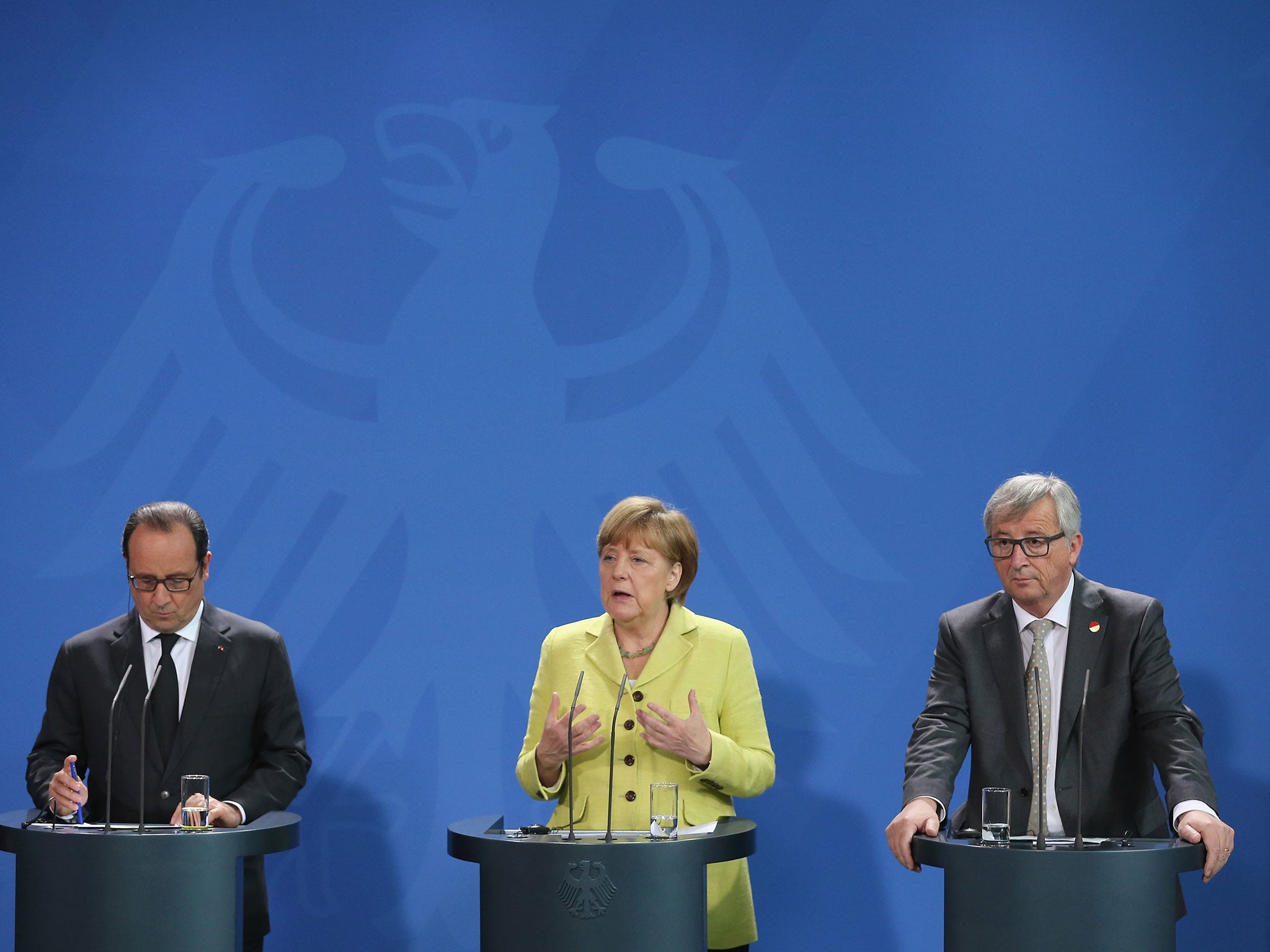EU referendum: David Cameron will use vote to 'dock' Britain to Europe, says EC president
Jean-Claude Juncker said he did not believe British voters want to leave EU

Your support helps us to tell the story
From reproductive rights to climate change to Big Tech, The Independent is on the ground when the story is developing. Whether it's investigating the financials of Elon Musk's pro-Trump PAC or producing our latest documentary, 'The A Word', which shines a light on the American women fighting for reproductive rights, we know how important it is to parse out the facts from the messaging.
At such a critical moment in US history, we need reporters on the ground. Your donation allows us to keep sending journalists to speak to both sides of the story.
The Independent is trusted by Americans across the entire political spectrum. And unlike many other quality news outlets, we choose not to lock Americans out of our reporting and analysis with paywalls. We believe quality journalism should be available to everyone, paid for by those who can afford it.
Your support makes all the difference.David Cameron wants to use the upcoming EU referendum to “dock” Britain permanently to Europe, the EC president Jean-Claude Juncker has claimed, in remarks that will be met with dismay in Downing Street.
In an interview just days after he held talks with Mr Cameron at Chequers, Mr Juncker said he did not believe that British voters wanted to leave the EU and suggested that a “yes” vote would reinforce the union.
“Brexit is not a question which arises, it’s not desired by the British,” Mr Juncker told the German Süddeutsche Zeitung newspaper. “Cameron wants to dock his country permanently to Europe.”
Mr Juncker’s remarks reflects a view among a growing number of European leaders that there are very few circumstances in which the Prime Minister would be prepared to countenance recommending Britain’s withdrawal from the EU.
But the comments, from a man widely vilified by Tory Euro-sceptics, will not be welcomed by Mr Cameron. A Downing Street spokeswoman insisted the Prime Minister was clear that the referendum was about giving “British people” the right to decide on EU membership.
Speaking on a visit to London Norbert Roettgen, the chairman of the Bundestag’s foreign affairs committee and ally of Angela Merkel, said there was scope for “legal creativity” to meet some of the UK’s demands.
But he reiterated that he did not believe treaty change was a “realistic option within the course of two years”.
In somewhat provocative remarks Mr Roettgen said he did not sense there was any real appetite among the British public to leave the EU and that Mr Cameron’s planned referendum was more about internal Conservative divisions.
“The dilemma stems from a problem within the Tory party, he said.
“It’s not about Euro governance, it’s not about immigration but it is about a problem within the Tory Party, which couldn’t be resolved within the party.
“So there was a need for creativity to resolve this problem in a different way [for example, a national referendum]. Now we have a European problem to resolve and we try as tough as we can to resolve this problem.”
Mr Roettgen said there is still significant concern in Berlin that Mr Cameron’s key demand that Britain should be allowed to restrict benefits payments to EU migrants is incompatible with European law that requires all citizens to be treated equally in the country where they are living.
At a briefing at the German ambassador’s residence in London, Mr Roettgen suggested that instead the UK might have to change the way its own citizens qualified for benefits, moving to a contributory system, in order to avoid breaking anti-discrimination rules.
“The question seems to me to be quite clear, any proposal that aims at establishing rules of discrimination against citizens of the other member states will not work because it goes to the heart of the European Union,” he said.
But he added that at a time of unprecedented challenge to Western values from both Russia and Islamic fundamentalism it was more important than ever that Europe was united.
“We need to re-invent the Western project,” he said.
“We are a minority in values and we have to close our ranks stay together and defend our values that are under attack. We need to get stronger and more united this is clearly the perception of Washington.”
Meanwhile, Norway’s foreign minister warned that Britain would have to accept most EU law if it wanted to continue to have access without a place around the table.
Norway, which is a member of the European Economic Area (EEA) but not the EU, is regarded by some Eurosceptics as a model for the UK if it votes to leave the Union.
“What is a challenge is that we do implement a lot of the decisions of the EU without being around the table,” he said.
“Our arrangement, being part of the EEA, is that we have to implement all the EU directives but we are not around the table when these are discussed in Brussels.”
Mr Brende said the arrangement gave Norway “a bit more flexibility” in other areas, such as having its own currency and foreign and security policy.
Join our commenting forum
Join thought-provoking conversations, follow other Independent readers and see their replies
Comments